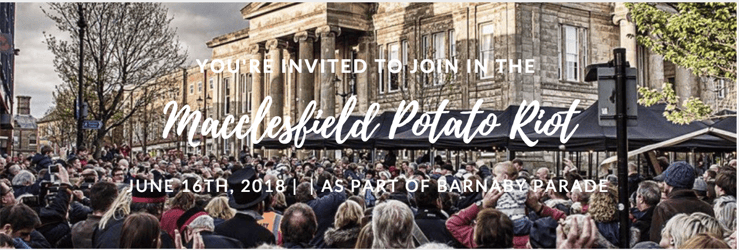History
13th April 1812: Rioting in Macclesfield
The following passage from the Chester Courant of 21st April 1812 describes the rioting that took place in Macclesfield on Monday 13th April 1812:
Yesterday week, Mr Daniel Rowson, a factor of great business in Macclesfield, received a letter from Stockport, threatening the immediate destruction of his and his neighbours’ property. Already the rioters had begun to assemble in the fields adjoining the town, and by noon, finding they have sufficient force to carry their determination into effect, they entered the Market-place. They proceeded to enquire how potatoes sold, and not approving the price, began to throw them about the streets; five bags were thus disposed of, when the foremost of them, leaving a blue ribbon in his hat, was taken into custody and lodged in the common gaol by order of the Magistrates. The word “rescue!” was given, the doors of the gaol broken, the man set at liberty, and carried in triumph to the Market-place in an instant of time, the mob bellowing and shouting. After a short deliberation, two, apparently the ringleaders, held up a stick—the signal was answered by a universal huzza, and the whole body set forward to the premises of Mr. Rowson, in Mill-street. Here they demolished all the windows, broke the door of the shop, and rolled the cheeses and other articles through the streets. When the destruction was complete, and another shout of triumph had succeeded, they took the road through Pickford and Sunderland streets to the shops of Messrs. John Holland, Simon Malkin, Rupert Malkin, Samuel Clowes, Matthias Mason, and several others, some of which they completely gutted, destroyed the windows and furniture, and were guilty of greater excesses as they proceeded. A company of the Royal Cumberland Militia were mustered by beat of drum immediately when the riot began. They followed the men from street to street without success, some time, but coming up with them in Mill-street, the riot act was there read by W. Ayton, Esq. one of the Borough Magistrates. The act was repeated in the Market-place, without any other effect than further to exasperate the populace. The magistrates, who had hoped to appease the tumult by show of arms, now saw the necessity of employing force; but, still reluctant to shed blood by the use of the musquet, they summoned the Macclesfield Troop of Volunteer Cavalry. The cavalry mustered at 4 p.m. under the command of their captain, J.S. Daintry, Esq. and marched to the Waters, and from thence on a hand gallop to the factory of Messrs. Goodal and Birchenhall, wither the mob had proceeded.
The rioters fled as the cavalry advance, but were not dispersed until they had broken the windows, doors, &c. of Mr. Wood, threatening his life.—The fields having been cleared, the mob again entered the town, and threatened a rescue of those who had been taken prisoners, but by the prompt measures of the military and the magistrates, order was finally restored. On the following morning three of the rioters, who had been secured, were examined, and were, under a strong escort, brought our county gaol on Wednesday last, to take their trials at the next Spring Assizes. Their names are Wm. Stubbs, John Livesey, and John Jackson. The total number of rioters at one period, amounted to at least 5000, few of whom, it appears, were residents of the town of Macclesfield. Of the Macclesfield cavalry, two were severely hurt; Mr. Higginbotham, an alderman of the borough, had his arm broken; Mr Grimsditch, solicitor, received a severe contusion on the head: many others were struck violently, but none dangerously wounded. Of the rioters, one person, a woman, was unfortunately trampled upon, and had her arm broken; and the prisoner Stubbs also received a deep gash in the head, when in the act of violently assaulting Mr. Grimsditch.

